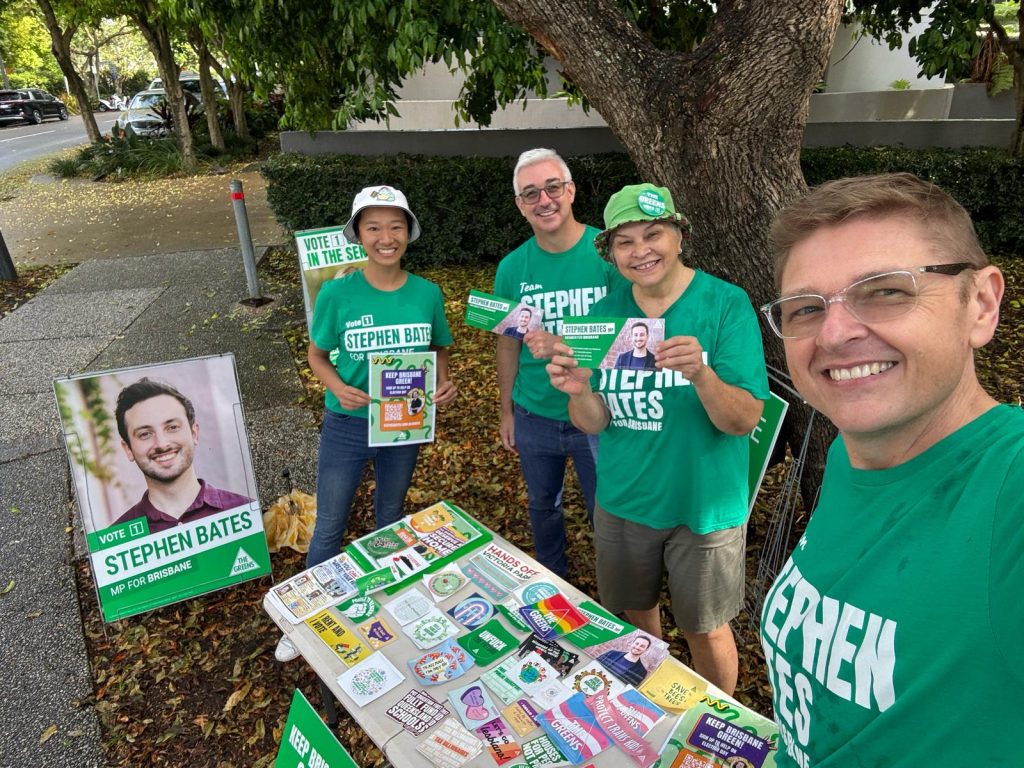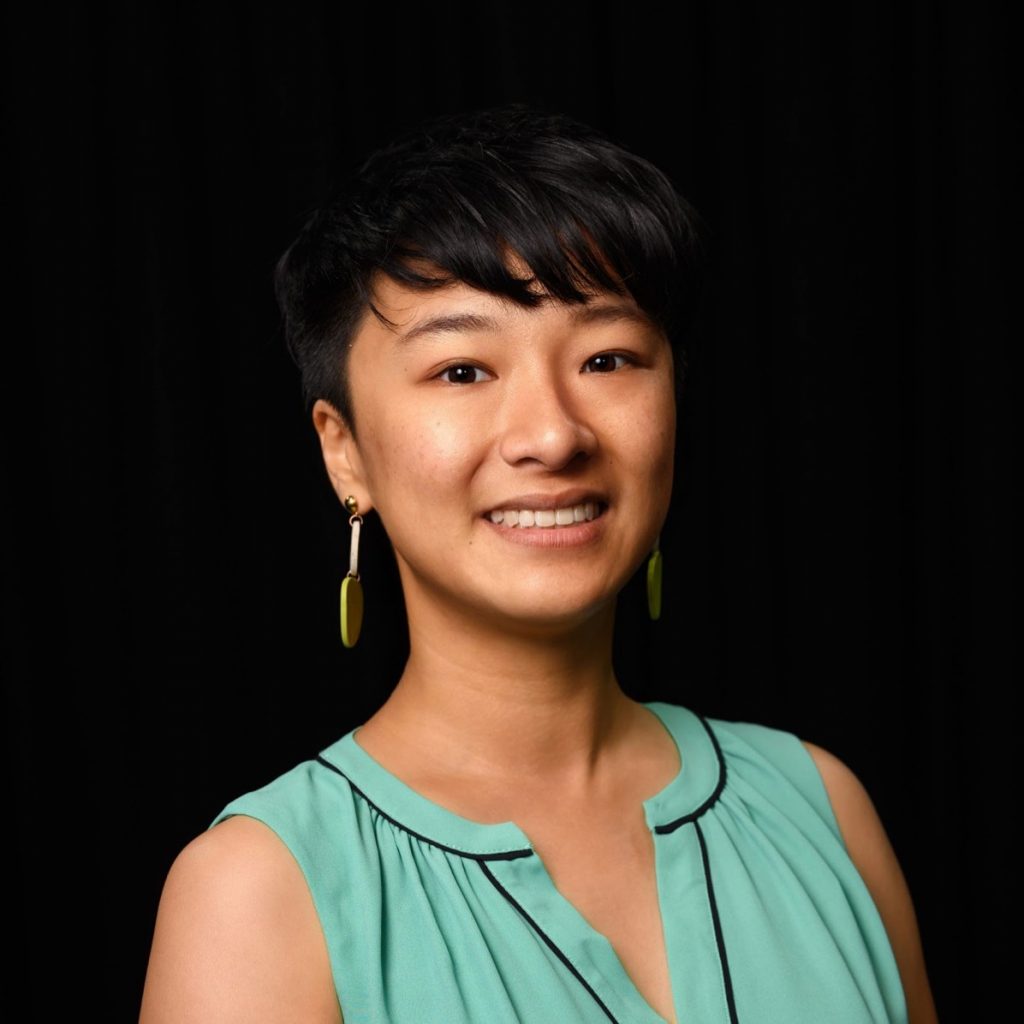We will continue to be present in and for our communities, in and out of Parliament. Holstein Wong affirms the potential of our prefigurative politics, building solidarity across struggles from housing and climate to Palestine.
As the rain continued to pour down on election night, Greens volunteers trickled in from various booths across Brisbane, Griffith, Ryan, Moreton, and surrounding electorates, joining our election night party. I felt varying combinations of anxiety, cautious optimism, and defiance — that no matter what the results rolling in looked like, we had done our best and would continue to stand up against enterprises and billionaires seeking to manipulate our society and exploit our planet for private gain.
This had been a long campaign for Queensland volunteers. In the last two years we’ve had four elections of non-stop campaigning: the Voice Referendum concurrent with local council campaigns, then going straight into the Queensland state campaign in which I ran as a candidate, followed immediately by the Federal campaign.
Overlaid throughout all of this is the ongoing genocide in Gaza and the fortnightly protest marches and actions that many of our volunteers are actively involved in, on top of work and care responsibilities. Personally, my childcare responsibilities meant that I stepped back from doorknocking in the months leading up to the Federal election, but I was keeping up a regular Greens presence at our local farmers’ markets, making supporter calls, helping at early voting and coordinating our volunteer efforts at a polling booth on election day.
Despite campaigning while living through multiple crises — housing, climate, geopolitical, late-stage unfettered capitalism — our grassroots movement resonated with hope, positivity, and the conviction that our governments can afford to take better care of everyone in our communities, not just the privileged few.
We can be proud of our votes holding in the face of unprecedented levels of attacks from vested interests. But there’s no glossing over the devastating loss of our Federal representatives and the disappointment that the stagnant two-party system lives on for another term. We know our attempts at transformative change will result in setbacks along the way, and the win-or-lose of electoral politics is brutal.
Heartbreaking as it is, it’s been amazing to have had the lived experience of Greensland. The resources and platform of publicly elected representatives has amplified our messages beyond our traditionally limited reach, and I believe this will persist.
Typically the media in this country have ignored the Greens, further entrenching the two-party binary. We now have more spokespeople who are recognisable allies that people have directly connected to and can rally around. We also now have hundreds of thousands more people who have experienced having an MP who isn’t aligned with one of the major parties.
What made this Federal campaign unique for me was that we could share the refreshing experience of having Stephen Bates as our local Greens MP for the past three years. Most folks have very low expectations of politicians and Stephen raised the bar by being an active MP and community organiser. He used his platform and resources to consistently show up and take action.
Rather than just seeing him in the media or by appointment, Stephen was available, approachable, out in the community, constantly in parks, doorknocking, firing up the BBQ, cleaning up after natural disasters, and rallying ordinary people to collectively care about the community beyond ourselves.
This is what I value about the Greens movement — our politics are local and grassroots, leveraging whichever level of government resources available. We stay scrappy and innovative to stretch those resources in creative and useful ways for direct action. We are present and on the ground, and that’s very annoying to those who are used to having preferential access to decision-makers by exclusion of others.
On election day I spoke to a middle-aged man who told me he was a first-time Greens voter. His reason was that he has a transgender child and he is so grateful for the direct advocacy from Stephen Bates and Michael Berkman (Queensland Greens MP for Maiwar).
For everyday people who feel that Federal politics doesn’t affect their day to day lives, I was hopeful that this lived experience would change perceptions of the role of an active MP and what they can deliver outside of Parliament.
The trouble is that our electoral system and the structure of our daily activities and social interactions don’t match. While doorknocking I spoke to a woman who said that she had never spoken to Stephen or attended any events. She admitted that she tends to keep to her own circles and acknowledged that that was probably a bigger factor than a lack of effort from the Greens. Our electoral divisions are geographical, but most of us spend our lives along other lines based on work and interests, and don’t have a sense of location-based identity or representation.
I don’t think any electoral project alone is strong enough to get folks in an area to feel part of a coherent place-based community. Indigenous leaders speak of place and connection to country. We need to intentionally practice this to counteract forces of atomisation and alienation in our society. At the same time, we have to find ways to build community power beyond arbitrary electoral boundaries to address universal concerns such as climate justice and social justice.
I see success and longevity when we support grassroots community groups and issues with shared values, nurture links between stratified pockets, and advocate for the preservation and extension of public spaces, which are crucial places for shared activities and connections.
One final theme common across the campaigns centred on people’s discomfort that the Greens are bringing political discussions and negotiations into the open, both inside and outside of Parliament. Perhaps it’s too ingrained into the everyday Australian cultural identity to not care about or query politics too much, apart from the obligatory surface-level whinge. Often folks that we doorknock are apologetic that they “don’t’ really pay attention” to politics; while others respond defensively as if we’ve prodded a vulnerability.
When our elected representatives openly negotiate with the major parties, they’re portrayed by the media as disruptive, perpetuating the narrative that our behaviour goes against cultural norms. The established political class would certainly prefer these discussions to stay behind closed doors, again to maintain power by exclusion and keep us settling for the status quo.
With the Coalition potentially held at bay for the moment, I see some clear space now with opportunities for us to nurture more dialogue and lead public discourse on what a healthier democracy could look like. We can plant more seeds for a future minority government with a crossbench that can hold the government’s agenda to account, domestically and globally. Part of this will involve continuing to do our politics in the open and inviting people who previously felt intimidated or excluded from participation. In the past few years I’ve met some amazing and dedicated people living their values through mutual aid, resource sharing (Brisbane Tool Library), and organising our communities, and I’ll continue to create spaces and strengthen connections where we can cross-pollinate and support each other.
Systemic change is not linear and will take time, but I’m hopeful that we can keep raising people’s collective expectations of what politics and community power can deliver. We’ve contributed to the collapse in the LNP vote and motivated Labor to adopt our policies. We’ve learned that our span of influence and control may be limited, but we can be ready when favourable circumstances arise again. We’ve made it the new norm that MP’s are activists, organisers, and feed their communities, and the incoming major party MP’s will ignore this at their peril, now that they know what we’re capable of.
We will continue to be present in and for our communities, in and out of Parliament.
Holstein Wong is a community volunteer, new parent, and industrial technology professional working and living on unceded Turrbal and Jagera Country.
Image credit. Feature image, provided by Holstein Wong.

